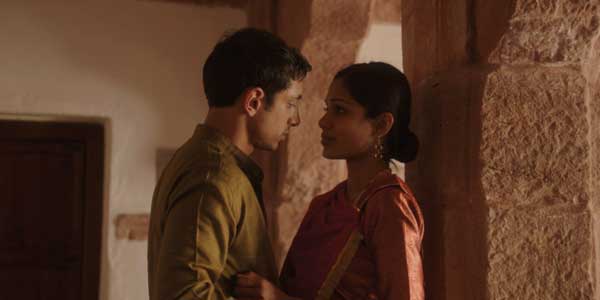
Director: Michael Winterbottom
Running Time: 113 mins
Certificate: 15
Release Date: March 9th, 2012

There have been various themes running through the incredibly eclectic films of Michael Winterbottom. He’s shown a deep interest in music (24 Hour Party People), delved repeatedly into foreign countries and politics (A Mighty Heart, Welcome To Sarajevo), and experimented with different naturalistic, almost documentary styles (9 Songs, The Road To Guantanamo).
There’s also been a bit of an obsession with the works of Thomas Hardy, as he’s made Jude, based on Jude The Obscure, The Claim, which took The Mayor Of Casterbridge to the 19th Century American frontier, and now Trishna, which is Tess Of The D’Urbervilles in modern-day India. With an almost improvised style, culture clash themes and mix of musical types, the film brings together a whole heap of Winterbottom’s interests.
Instead of Tess we have the titular Trishna (Freida Pinto), the daughter of an auto-rickshaw owner, whose livelihood is thrown into jeopardy after an accident writes off her father’s Jeep. Trishna goes to work for Jay (Riz Ahmed), a young Brit who’s reluctantly come to work in his father’s newly acquired hotel business in Rajasthan. He is captivated by Trishna, but not that interested in the hotel business.
Their fledgling relationship is marred by a clash of cultures, with Jay not realising the strong traditional ties Trishna still feels and which result in shame that drives her back to her family after she and Jay first make love. A few months later Trishna realises she’s pregnant, something disgraceful in the traditional rural society she comes from, and so her father arranges a secret abortion without Jay even knowing his girlfriend was pregnant.
She and Jay then reconcile, and he convinces her to run away with him to Mumbai, where no one will care that they aren’t married. She adapts to her new life and they both seem happy, but the spectre of the abortion hangs over them, as does Jay’s increasingly domineering behaviour, which could have tragic results for both of them.
There are few authors I hate more than Thomas Hardy. To me his books are tedious, melodramatic, overly wordy bilge, and I can’t understand why anyone would want to read one of his novels. Winterbottom is one of his few filmic devotees, as while Hardy’s works have popped up on TV a fair amount, they rarely get adapted for cinemas – indeed, half the cinematic films based on Hardy in the last three decades were directed by Michael Winterbottom, so he really is a bit of a lone voice when it comes to the Victorian author. Here he keeps the plot – and to give Hardy his due, he was always very good at storyline – but removes a lot of the histrionics, resulting in a film that’s a lot easier to watch than Hardy is to read.
It’s a quiet tale, told in a naturalistic style, with much of the dialogue appearing to be improvised. It works extremely well, allowing the film to get under the skin of the relationship between Trishna and Jay. Particularly in the early stages, it does a great job of allowing the characters to talk like real people, letting the attraction and uncertainty of early love to build. It’s beautifully portrayed. I’m still not convinced Freida Pinto is a good actress, but she works well here as the one thing she’s superb at is seeming innocent, and she exudes that here.
With Winterbottom’s globe-trotting movies, he always been interested in telling stories that suggest that no matter how different a culture and place seems, underneath surface differences people remain the same. He does a very good job of that here, and not just by taking a Victorian tale of British classes division to modern India, but in creating a romance that seems universal.
The film’s main problem arises towards the end. There’s a rather awkward tonal shift, with characters whose evolution has seemed very natural up to that point, starting to look a little like they’re only there to service where the plot needs to take them. After the duo’s relationship starts to sour, the film is once more quite skilfully told, but it lacks the power it should have due to a rather clumsy move from Jay seeming a pretty good catch to something more sinister.
It’s a shame as it really detracts from what is otherwise a small delight; a journey into the heart of India, the clashing of cultures and the simple universal truth of love – with all the happiness and pain that entails.
Overall Verdict: Taking Tess Of The d’Urbervilles to India works surprisingly well, with Winterbottom creating a nicely observed, naturalistic love story. It’s just a shame an awkward shift towards the end rather undermines things.
Reviewer: Tim Isaac





Leave a Reply (if comment does not appear immediately, it may have been held for moderation)